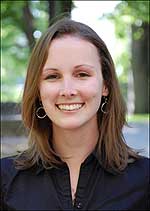
Using the analogy of a nano-taxicab to describe her research on developing an improved drug delivery system, Kelsey Beavers won first place March 27 in a Three-Minute Thesis Competition for Vanderbilt graduate students, and she tied for the People’s Choice award, taking two of the three awards given at the event.
The challenge: All 49 participants had to summarize their 80,000-word doctoral theses in less than three minutes and use only a single PowerPoint slide.
What makes this challenge even more unusual and particularly anxiety-provoking for the young scholars is the requirement that they explain their research in terms that members of the public can understand.

From preliminary rounds, 12 were chosen as finalists. Biomedical engineering student Brian Evans also was a finalist. Ten engineering graduate students entered the 2015 3MT Competition.
Beavers, a Ph.D. candidate in interdisciplinary materials science, works with Craig Duvall, assistant professor of biomedical engineering, to develop nanotechnology that could deliver drugs for a broad range of related applications, including faster skin healing for burn patients and faster healing of foot wounds in diabetic patients.
The third annual competition was sponsored by the Graduate Student Council (GSC), and three cash awards were given: $1,500 for first place, $750 for second place and $350 for people’s choice, which is selected by the audience.
The 3MT competition originated at the University of Queensland in 2008 and has since spread throughout Australia and overseas. The competition now takes place at more than 170 universities around the world.
“I learned a whole lot in very little time,” commented Ronnie Steine, at-large-member of the Nashville City Council who served as one of the finalist judges. “I was so impressed with both the clarity of the presentations and the passion with which they were presented.”
He was joined on the panel of judges by Ellen Pryor, director of communications for The Frist; Stefanie Murray, executive editor of The Tennessean; Rebecca Bryant, project manager for researcher information systems at the University of Illinois Library; Susan Wente, provost and vice chancellor for academic affairs; Vicki Greene, senior associate dean for graduate education; and Richard Hoover, associate dean of the graduate school.
Engineering doctoral students in the competition:
- Kelsey Beavers, IMS, Engineering Porous Silicon Nanoparticles for Therapeutic MicroRNA Inhibition
- Rebekah Conley, BME, Engineering better outcomes for breast cancer surgery
- Brian Evans, BME, Popping Balloons: A Cure for the Common Heart Attack
- Maryse Lapierre-Landry, BME, An analytical model of photothermal optical coherence tomography
- Trina Merrick, EnvE, How does your garden glow? Mapping fluorescence of fragmented landscapes in Brazil
- Kristin Poole, BME, Noninvasive Imaging Reveals Vascular Responses to Novel Antioxidant Therapies
- Yonathan Reches, CEE, Concrete for storage of spent nuclear fuel
- Amy Shah, BME, Single-cell microscopy resolves response to anti-cancer treatment
- Joseph Sharick, BME, Predicting Clinical Response to Breast Cancer with Optical Metabolic Imaging
10. Shuhai Zhang, CEE, Variational Multiscale Enrichment Method for hypersonic aircraft subject to extreme loads
Contact:
Brenda Ellis, (615) 343-6314
Brenda.Ellis@Vanderbilt.edu
Twitter @VUEngineering